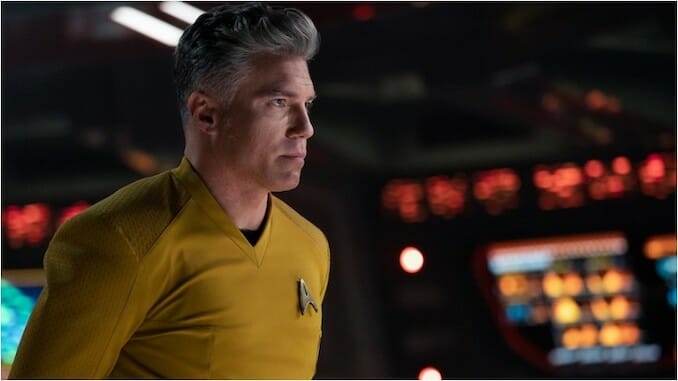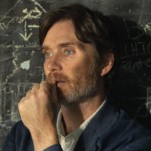Star Trek: Strange New Worlds‘ Captain Pike Is the Leader the World Needs Right Now
Photo Courtesy of Paramount+
Star Trek: Strange New Worlds is the fifth spinoff to hit the airwaves since Paramount+ (then known as CBS All Access) decided to really commit to building out a Star Trek television universe in 2017, but it is probably the series that feels most familiar to viewers. Star Trek Discovery was initially conceptualized as an original series prequel before reinventing itself by blasting its crew a thousand years into the future. Star Trek: Picard aimed to continue the story of Star Trek: The Next Generation’s famously beloved captain. Star Trek: Lower Decks is an animated series about the largely faceless second-string crew members who keep the ships of Starfleet running, and Star Trek: Prodigy is a kids cartoon about a gang of space misfits finding a family in one another. Strange New Worlds, on the other hand, is Star Trek as most casual viewers understand and remember it: a rollicking, entertaining adventure through space, boldly going where no man has gone before
Grounded in the hopeful, big-hearted principles of franchise creator Gene Roddenberry’s vision of a better tomorrow, Strange New Worlds’ full-throated embrace of optimism and possibility feels like a revelation in our current television landscape, where so much of what we find on our screens—and in our daily news reports—is grim, bleak, and depressing. Our citizenry seems more divided than ever before. Our leaders frequently take advantage of people’s worst fears and prejudices rather than speaking to their hearts or encouraging their better angels. And our television programs run the gamut from dark and edgy to shallow and vapid, with deeply flawed heroes competing for airtime with wannabe Instagram influencers desperate for fame, offering few solutions to the problems our world faces.
Of course something like Strange New Worlds, with its throwback episodic feel, charming ensemble cast, and unabashedly heart-on-its-sleeve style of storytelling, lands like a thunderclap on our screens in a moment like this. More than ever right now, we all want to believe in the possibility that is the continuing mission of the U.S.S. Enterprise and the better world that Rodenberry’s vision promises us. And maybe most importantly, we want to believe in Captain Christopher Pike (Anson Mount), one of the most honest and heartfelt examples of a genuinely good man on television today.
Look, we should always stan a Southern gentleman who knows his way around a kitchen (and looks really good in an apron to boot), but what makes Pike so groundbreaking as a character are the ways he pushes back against stereotypical ideas about what masculinity and authentic leadership are supposed to look like.
A man who joined Starfleet not as part of a quest for personal glory but for the chance to serve something greater than himself, Pike is a quiet, everyday sort of leader, who succeeds by lifting up those around him far more often than he does centering his own desires. He believes in the central tenets of Starfleet: Service, sacrifice, compassion, and love, and he repeatedly chooses to live those values in both good times and bad. (And whether others can see him do so or not.)
Where previous Star Trek captains like James Kirk (William Shatner) or Jean-Luc Picard (Patrick Stewart) are known for their brash machismo or erudite intelligence, Pike’s defining characteristic is his heart. He possesses a seemingly boundless well of empathy that allows him to both respect and try to relate to everyone he meets, whether that means talking an anxious cadet down from the proverbial ledge on a new shift rotation or reaching out a hand in friendship to a seemingly hostile alien race.
-

-

-

-

-

-

-

-

-

-

-

-

-

-

-

-

-

-

-

-

-

-

-

-

-

-

-

-

-

-

-

-

-

-

-

-

-

-

-

-








































